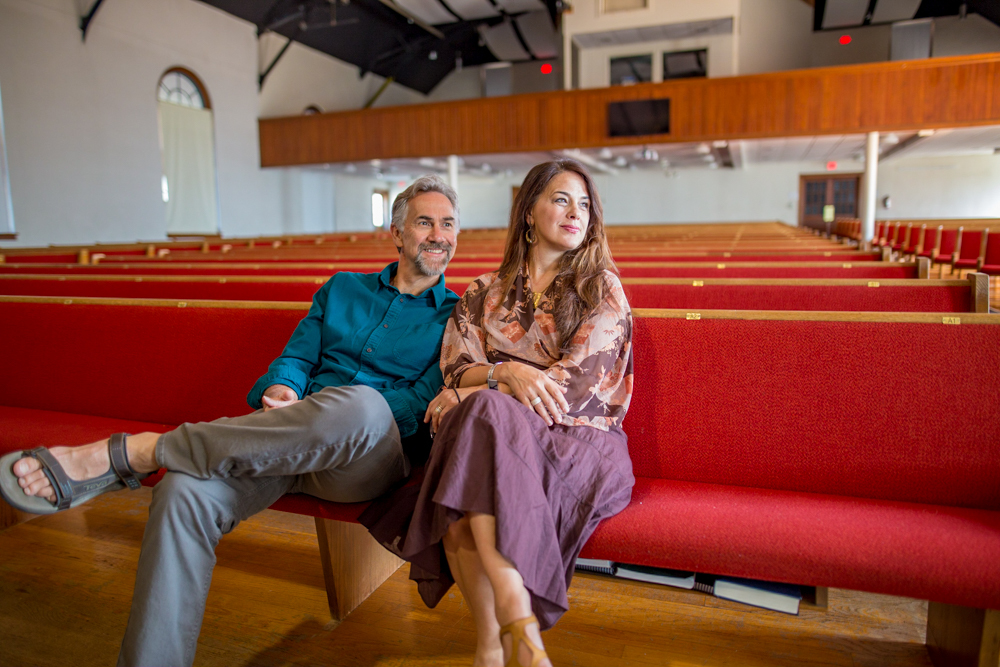When Ingrid De Sanctis ‘88 and Ted Swartz ‘89, MACL ‘92, debut their theatrical celebration for Eastern Mennonite University’s Centennial in Lehman Auditorium during Homecoming and Family Weekend this fall, they hope it will give audience members the same goosebumps they have felt while working on the production.
The 90-minute performance of What we bring. What we take. What we leave. — slated for 8 p.m. on Friday, Oct. 13, and Saturday, Oct. 14 — will be a collage of stories of the experience of being a student at EMU.
“We hope this production will appeal to many in our wide community while honoring EMU’s story of transformation, both past and into the future,” said Louise Hostetter ’79, chair of the Centennial committee.
The alumni duo has collaborated as professional playwrights, actors and directors for more than 20 years. De Sanctis graduated in 1988 and is a professor of theater at James Madison University. Swartz, who graduated in 1989 and then earned a master’s degree in church leadership in 1992 from Eastern Mennonite Seminary, has written and produced more than a dozen plays, traveling extensively worldwide for performances, first with Lee Eshleman ’86 in Ted & Lee, and now with Ted & Company.
In addition to drama and laughter — “because we love funny,” said De Sanctis — the production has moments of poignancy.
“These are really tender years when you are in college, whether you are a young adult or returning to school as an older learner,” she said. “You’re finding out who you are. There are ups and downs to that.”
The playwrights hope that viewers will recognize familiar names and themselves in stories similar to their own — but also be surprised with “I didn’t know that” moments.
A handful of unannounced special guests will join De Sanctis and Swartz on the stage, as will seven other actors from over the decades of EMU theater: Don Shenk ‘82, of Temple City, California; Helen Stoltzfus ‘78, of Oakland, California; and Trina Trotter Nussbaum ‘00, MA ‘17, Braydon Hoover ‘11, Tim Ruebke ‘93, MA ‘99, and Stan Swartz ‘87, all of the Harrisonburg area.
The production explores the idea of place — the campus and its buildings such as Lehman Auditorium, Oakwood, the Discipleship Center and elsewhere — and challenge and growth, “like when your mind exploded in a classroom or in chapel, or because of your roommates, or your cross cultural,” De Sanctis said.
In one scene, said Swartz, a daughter is home from her Middle East cross-cultural and tries to explain her experience to her mother. The student is left feeling place-less, like her life has less meaning now because of her heightened awareness of struggles elsewhere. It’s a portrayal of the tension of being an institution that was created to protect youth from worldly influences — “and Goshen College, quite honestly,” Swartz said — yet would later require its students to explore and learn from the world.
In their research over the last two years, the playwrights solicited memories from the EMU community, but also thought back to their own stories. De Sanctis, from a Pentecostal background, was inspired by the “quiet faith” and four-part harmony of Mennonites. Swartz was an older seminary student “in the front row with my hand up all the time” whose time at EMU changed his eventual profession, though not his calling: becoming “a communicator with passionate involvement in a career that makes a difference” landed him not in an expected pastorate but in theater, a pursuit that began in the same space where he will be presenting this production, Lehman Auditorium.
“The more personal the story, the more universal it becomes,” said De Sanctis, who also discovered theater at EMU. “My foundation in arts started at EMU, and my life choices are connected to EMU. Working on this has brought back a lot of gratitude for EMU. It’s a really special place.”
The production is sponsored by Everence Financial, a faith-based, member-owned financial services organization offering banking, charitable gift planning and financial services to individuals, organizations and congregations.
